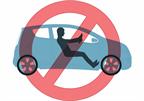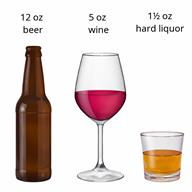Alcohol Intoxication
Alcohol intoxication occurs when a person no longer thinks clearly or functions well after drinking alcohol. This is also referred to as becoming impaired. Intoxication can occur with just one drink. The legal definition of alcohol intoxication depends on the amount of alcohol in the blood (
blood alcohol concentration, BAC). BAC of 80–100 mg/dL or higher is commonly considered legally intoxicated. The level of impairment depends on:
The amount of alcohol the person had.
The person's age, gender, and weight.
How often the person drinks.
Whether the person has other medical conditions, such as diabetes, seizures, or a heart condition.
Alcohol intoxication can range from mild to severe. The condition can be dangerous, especially if the person:
If you or anyone around you appears intoxicated, speak up and act.
What are the causes?
This condition is caused by drinking alcohol.
What increases the risk?
The following factors may make you more likely to develop this condition:
Peer pressure in young adults.
Difficulty managing stress.
History of drug or alcohol abuse.
Family history of drug or alcohol abuse.
Combining alcohol with drugs.
Low body weight.
Binge drinking.
What are the signs or symptoms?
Symptoms of alcohol intoxication can vary from person to person. Symptoms can be mild, moderate, or severe.
Symptoms of mild alcohol intoxication may include:
Feeling relaxed or sleepy.
Having mild difficulty with coordination, speech, memory, or attention.
Symptoms of moderate alcohol intoxication may include:
Strong anger or extreme sadness.
Moderate difficulty with coordination, speech, memory, or attention.
Symptoms of severe alcohol intoxication may include:
Intoxication can change quickly from mild to severe. It can cause coma or death, especially in people who do not drink alcohol often.
How is this diagnosed?
Your health care provider will ask you how much alcohol you drank and what kind you had. Intoxication may also be diagnosed based on:
Your symptoms and medical history.
A physical exam.
A blood test that measures BAC.
A smell of alcohol on your breath.
How is this treated?
Treatment for alcohol intoxication may include:
Being monitored in an emergency department, hospital, or treatment center until your BAC comes down and it is safe for you to go home.
IV fluids to prevent or treat loss of fluid in the body (dehydration).
Medicine to treat nausea or vomiting or to get rid of alcohol in the body.
Counseling about the dangers of using alcohol.
Treatment for substance use disorder.
Oxygen therapy or a breathing machine (ventilator).
Drinking alcohol for a long time can have long-term effects on your brain, heart, and digestive system. These effects can be serious and may also require treatment.
Follow these instructions at home:

Eating and drinking

-
Do not drink alcohol if:
Your health care provider tells you not to drink.
You are pregnant, may be pregnant, or are planning to become pregnant.
You are under the legal drinking age, or under 21 years old in the U.S.
You are taking medicines that should not be taken with alcohol.
You have a medical condition, and alcohol makes it worse.
You need to drive or perform activities that require you to be alert.
You have substance use disorder.
- Ask your health care provider if alcohol is safe for you. If your health care provider allows you to drink alcohol, limit how much you have to:
-
Avoid drinking alcohol on an empty stomach.
-
Alcohol increases urination. It is important to stay hydrated and avoid caffeine.
-
Avoid drinking more than one drink per hour.
-
When having multiple drinks, drink water or a non-alcoholic beverage between alcoholic drinks.
General instructions
-
Take over-the-counter and prescription medicines only as told by your health care provider.
-
Do not drive after drinking any amount of alcohol. Plan for a designated driver or another way to go home.
-
Have someone responsible stay with you while you are intoxicated. You should notbe left alone.
Contact a health care provider if:
-
You do not feel better after a few days.
-
You have problems at work, at school, or at home due to drinking.
- You have any of the following:
Trouble staying awake.
Moderate to severe trouble with coordination, speech, memory, or attention.
You are told you may have had a seizure.
Vomiting bright red blood or material that looks like coffee grounds.
Bloody stool (feces). The blood may make your stool bright red, black, or tarry.
These symptoms may be an emergency. Get help right away. Call 911.
Also, get help right away if:
Take one of these steps if you feel like you may hurt yourself or others, or have thoughts about taking your own life:
Summary
-
Alcohol intoxication occurs when a person no longer thinks clearly or functions well after drinking alcohol.
-
Ask your health care provider if alcohol is safe for you. If your health care provider allows you to drink alcohol, limit how much you have.
-
Contact your health care provider if drinking has caused you problems at work, school, or home.
-
Get help right away if you have thoughts about hurting yourself or others.
This information is not intended to replace advice given to you by your health care provider. Make sure you discuss any questions you have with your health care provider.

